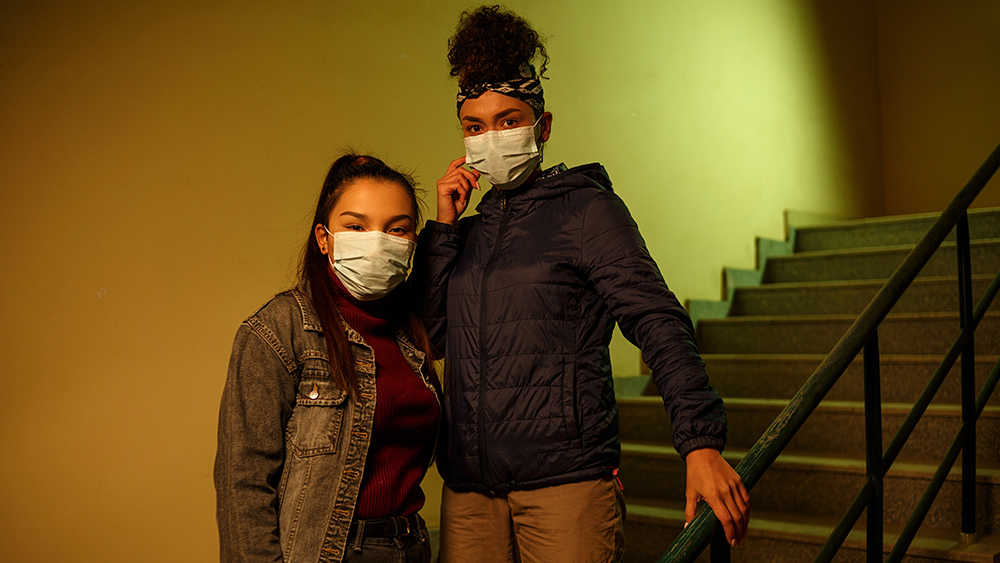What is social distancing and can it prevent the spread of coronavirus?
03/12/2020 / By Zoey Sky

According to Bruce Aylward, a World Health Organization (WHO) epidemiologist who led a mission to China, new cases of coronavirus (COVID-19) in the country are finally declining, thanks to the government’s extreme measures to contain the disease include case finding, contact tracing, and suspension of public gatherings.
Meanwhile, coronavirus is still spreading in the United States. Experts have yet to determine how fast and far the disease will spread, how many people will get infected, and how many of them will die.
Implementing the same tactics China used can help prevent the disease, along with actions such as social distancing. In the U.S., public health officials have access to some of the same effective tools to slow the spread of coronavirus.
Virologists in Washington state worry that coronavirus has been circulating for several weeks. State officials are even considering closing schools and are currently expanding testing for the illness. Local city and state governments in the U.S. are working tirelessly to control outbreaks in their respective regions.
But what can the federal government do to prevent outbreaks?
The federal government can:
- Order travel restrictions across borders.
- Quarantine travelers coming into the country.
- Counsel the country on outbreaks through the Centers for Disease Control and Prevention (CDC).
- Provide aid to local governments by offering data, resources and money.
While the federal government is essential for the creation and approval of diagnostic tests for the coronavirus that help officials determine where the virus is and how far it’s spreading, it’s authority is rather limited.
The good thing is, your city and state can try three broad public health strategies to help delay the spread of an outbreak in your area, even without the support of the feds.
Isolation and contact tracing
Isolation will separate those with confirmed infections from others. This allows the patients to recover without infecting anyone else, especially if, like with coronavirus, there are no treatments for the disease.
Once patients are isolated, it is important to find everyone they came in contact with to control the spread of coronavirus. It also allows health experts to find a patient’s source of the disease and isolate them.
Contact tracing will also identify those at risk of contracting the disease, allowing experts to place them under isolation or quarantine.
Nathan Grubaugh, an epidemiologist at the Yale School of Public Health, explained that to stop an outbreak, individual public health agencies must effectively detect cases, get them the care they need and put them into isolation. A patient’s hygiene is also a factor in stopping an outbreak.
Handwashing is key to preventing coronavirus, advised the WHO.
You must wash your hands:
- After coughing or sneezing.
- When taking care of someone who’s ill.
- Before, during and after food prep.
- Before eating.
- After using the toilet.
- When your hands are visibly dirty.
- After handling animals or animal waste.
Isolation is most effective when paired with contact tracing.
Quarantine patients before they exhibit symptoms
Quarantine helps restrict the movement of individuals who might have been exposed to an infection before they get sick.
People can be quarantined at home, or in another place, as long as they are away from other people. Those who have traveled to affected countries, or could end up involving large groups of people, can be quarantined. (Related: Italy joins Japan in closing schools due to coronavirus.)
Social distancing to prevent the spread of coronavirus
Isolation and quarantine are effective when public health officials can quickly detect cases and possible exposures to infection.
However, when something like coronavirus is spreading steadily in a population, tactics like social distancing are more efficient. This method tries “to keep human beings around six feet apart from one another.”
Compared to quarantine and isolation, social distancing is usually applied to whole communities and not specific people, explained Lindsay Wiley, a health law professor at the Washington College of Law.
Social distancing may involve measures such as canceling or postponing mass gatherings (e.g., religious gatherings, concerts or sporting events) or closing schools or telecommuting (working from home). During an outbreak, it is also best to rest and stay home if you’re unwell.
These decisions are local, which means they can, unfortunately, result in inconsistencies. Additionally, these decisions are often motivated by political concerns.
While social distancing measures have yet to come into place, it is crucial to familiarize yourself with them so you’re ready when the time comes. Maintain proper hygiene, avoid crowded areas and boost your immune system to prevent infections.
Sources include:
Submit a correction >>
Tagged Under:
China, containment, coronavirus, covid-19, disease, disease prevention, global emergency, how-to, infection, isolation, novel coronavirus, outbreak, pandemic, prevention, public events, Public Health, quarantine, social distancing, USA, virus, Wuhan, Wuhan coronavirus
This article may contain statements that reflect the opinion of the author
RECENT NEWS & ARTICLES
Infections.News is a fact-based public education website published by Infections News Features, LLC.
All content copyright © 2018 by Infections News Features, LLC.
Contact Us with Tips or Corrections
All trademarks, registered trademarks and servicemarks mentioned on this site are the property of their respective owners.





















